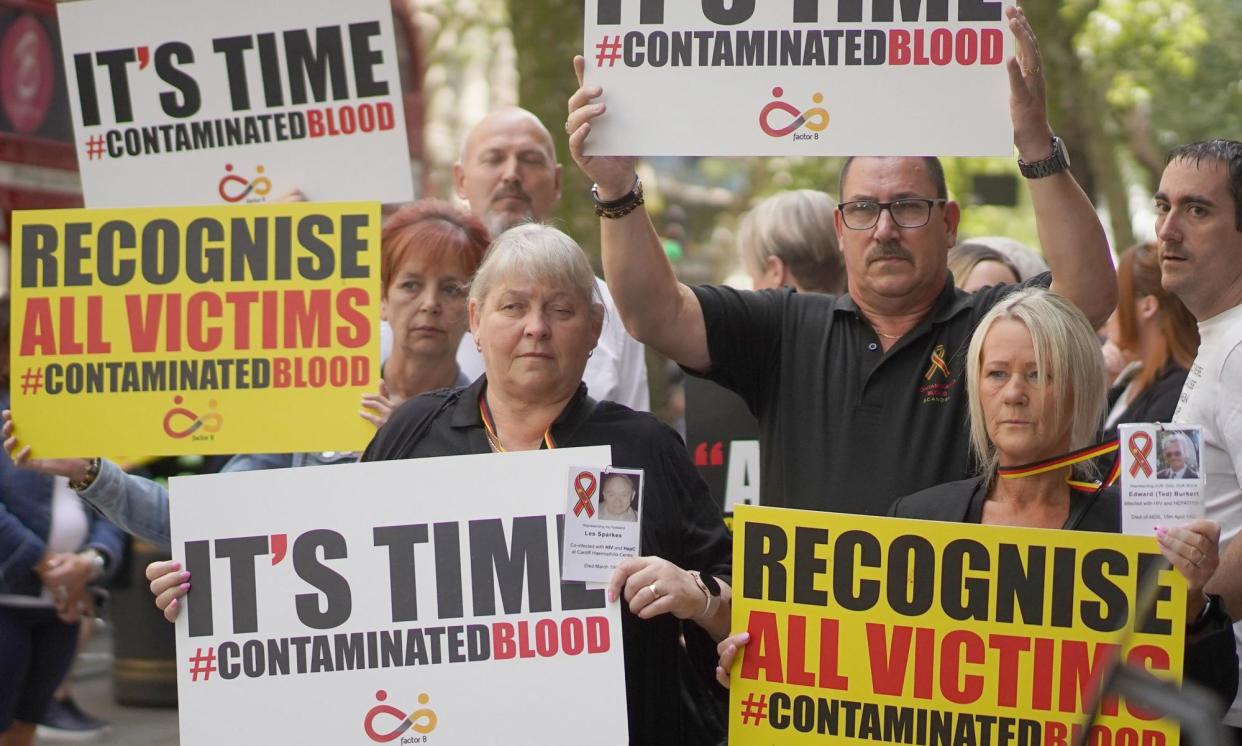Infected blood scandal: victims’ families call for action amid Post Office injustice

People affected by the contaminated blood scandal have called on ministers to also address their fight for compensation alongside government moves to fix the injustice suffered by sub-post office operators.
The ITV drama Mr Bates vs the Post Office has led to public uproar over the hundreds of people who were wrongly convicted of alleged theft, fraud and false accounting based on the Post Office’s flawed Horizon IT system and action is being taken to look at ways of speedily quashing convictions and ensuring everyone is compensated.
But with many people affected by the infected blood inquiry still awaiting compensation from a state failure that dates back even further, there is frustration that their cause is not generating similar attention.
About 2,900 people are believed to have died between 1970 and 2019 after being given factor VIII blood products that were contaminated with HIV and hepatitis C imported from the US in the 1970s and 1980s, or after being exposed to tainted blood through transfusions or after childbirth. It is estimated that one person who was infected is dying in the UK every four days.
Rosemary Calder, 75, whose son, Nicky, a haemophiliac, died in 1999 aged 25, having been infected with HIV when he was eight or nine, and who runs a support group for parents bereaved in the scandal, said: “We are right behind the Post Office victims, we know what it’s like to fight for justice for terrible wrongs that have been done. We applaud them for their campaign and we’re glad the government are addressing the issues of overturning wrongful convictions and payment of full compensation.
“However, I know that the majority of our community are really upset and frustrated at the government continually refusing to recognise every life lost to infected blood due to NHS treatment and to make the interim payments to bereaved parents and their children as recommended by [the infected blood inquiry chair] Sir Brian Langstaff.”
While interim compensation payments of £100,000 have been made to victims and bereaved partners, Langstaff’s recommendation regarding similar payments for bereaved children and parents, made in April last year, has not been implemented.
Calder is also upset that another Langstaff recommendation from last April – to set up a body chaired by a high court judge to administer compensation – has not been implemented, whereas one has just been announced for the Post Office scandal. She said parents of children who died from the infected blood scandal “fear that they will never see justice for their children”.
Jason Evans, 34, the founder of the Factor 8 campaign, whose father died after receiving contaminated blood, is one of those still awaiting compensation. He said: “It’s very apparent that government tends to act based upon headlines of the day as opposed to dealing with this because it’s the right thing to do.
“The public interest and the public knowledge of a scandal is what seems to wrongly drive the action as opposed to ministers and officials acting because they should.”
Parallels between the two scandals include state failures, some compensation being paid out but not to everyone affected, and victims of both dying before they could get compensation.
Evans said the relative lack of attention given to the contaminated blood scandal had led to him receiving an influx of messages from people upset that the Post Office scandal was being portrayed as “the biggest injustice”.
Rachel Halford, CEO of The Hepatitis C Trust, said: “The UK government has a long history of dragging its feet when it comes to delivering justice for people impacted by life-altering scandals, such as the contaminated blood scandal, which has gone on for half a century.
“No one who has been impacted by the failings of the government should ever be forced to spend the rest of their life campaigning for the government to do the right thing to correct historic wrongs.”
A government spokesperson said: “This [the contaminated blood scandal] was an appalling tragedy, and our thoughts remain with all those affected.
“We are clear that justice needs to be delivered for the victims and have already accepted the moral case for compensation.
“The report covers a set of extremely complex issues – and the government intends to respond in full to Sir Brian’s recommendations for wider compensation following the publication of the inquiry’s final report in March 2024.”


